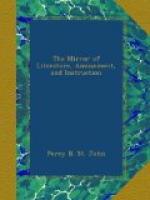United Service Journal.
* * * * *
SPIRIT OF DISCOVERY.
* * * * *
VENTRILOQUISM.
The art of the ventriloquist is well known: it consists in making his auditors believe that words and sounds proceed from certain persons and certain objects in his vicinity, while they are uttered by himself; and it is founded on that property of sound in virtue of which the human ear is unable to judge with any accuracy of the direction in which sounds reach it. This incapacity of the ear is the fertile source of many of those false judgments which impress a supernatural character upon sounds that have a fixed locality and a physical origin.—We know of a case, where a sort of hollow musical sound, originating within three or four feet of the ears of two persons in bed, baffled for months every attempt to ascertain its cause. Sometimes it seemed to issue from the roof, sometimes from a neighbouring apartment, but never from the spot from which it really came. Its supposed localities were carefully examined, but no cause for its production could be ascertained. Though it was always heard by both persons together, it was never heard when A. alone was in the apartment, and the time of its occurrence depended on the presence of B. This connected it with his destiny, and the imagination was not slow in turning the discovery to its own purposes. An event, however, which might never have occurred in the life-time of either party, revealed the real cause of the sound, the locality of which was never afterwards mistaken.
In order to understand what part this indecision of the ear performs in the feats of the ventriloquist, let the reader suppose two men placed before him in the open air, at the distance of one hundred feet, and standing close together. If they speak in succession, and if he does not know their voices, or see their lips move, he will be unable to tell which of them it is that speaks. If a man and a child are now placed so near the auditor that he can distinguish, without looking at them, the direction of the sounds which they utter, that is, whether the sound comes from the right or the left hand person, let the man be supposed capable of speaking in the voice of a child. When the man speaks in the language and the accents of the child, the auditor will suppose that the child is the speaker, although his ear could distinguish, under ordinary circumstances, that the sound came from the man. The knowledge conveyed to him by his ear is, in this case, made to yield to the more forcible conviction that the language and accents of a child could come only from the child; this conviction would be still further increased if the child should use gestures, or accommodate his features to the childish accents uttered by the man. If the man were to speak in his own character and his




